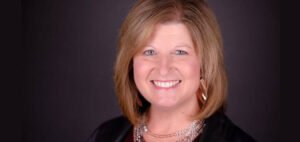Women drive 70% to 80% of consumer purchasing decisions, and companies with at least one woman on their board see higher returns on equity, according to the Women on Boards Project. Yet, despite these statistics, women occupy only 20% of board seats globally, with gender parity not expected for decades, as reported by Deloitte.
Cassie Burr, co-founder and executive director of the Women on Boards Project, is determined to change this landscape. In February 2020, Burr, along with co-founders Sheryl O’Loughlin, Melissa Facchina, and Kara Cissell-Roell, launched the project to increase female representation on the boards of private consumer companies.
Burr’s journey to founding the project was shaped by a series of professional experiences that underscored her commitment to elevating women leaders. After earning a math degree, she was recruited by Goldman Sachs, where she engaged in STEM and women-focused recruiting. Her passion for the human elements of organizations grew, leading her to an executive search firm in San Francisco and later to VMG Partners, where she became vice president of talent.
Burr’s early experiences came full circle when O’Loughlin, co-founder of Plum Organics and former CEO of Clif Bar, brought together a group of like-minded women, including Burr, Cissell-Roell, and Facchina, to address the lack of female representation in boardrooms. They identified a misplaced focus on a supposed “supply problem” of qualified women leaders, arguing instead that there is a rich pool of talented female candidates ready to serve on boards.
The Women on Boards Project launched with support from a consortium of investors, including VMG Partners, City Capital, and L Catterton. In its first year, 20 companies committed to adding women to their boards. To date, the project has successfully connected 60 women with board roles, including 10 matches this year.
Burr emphasizes the importance of avoiding “onlyness” in boardrooms, where a single member represents a demographic. She advises against underestimating the value of first-time board members, noting that their grit, passion, and relevant expertise can significantly benefit organizations.
The Women on Boards Project continues to grow, fueled by strong word-of-mouth referrals and a commitment to reshaping the boardroom landscape for women.




